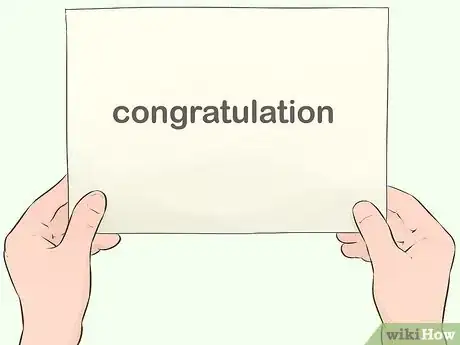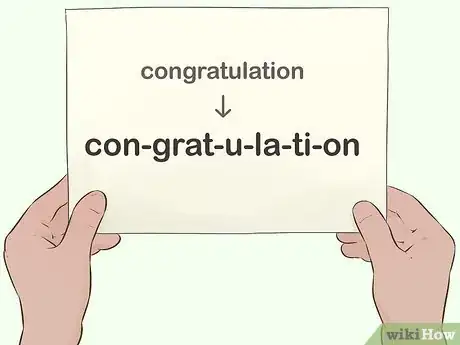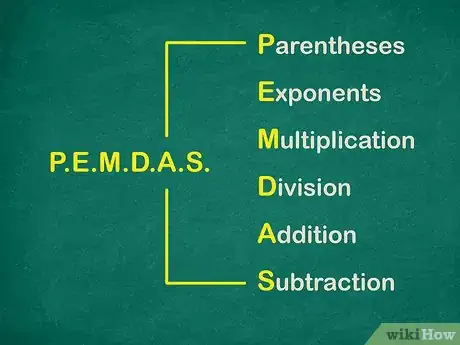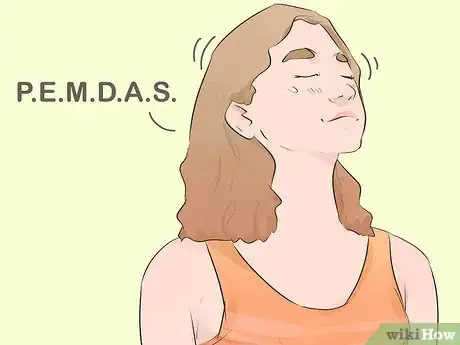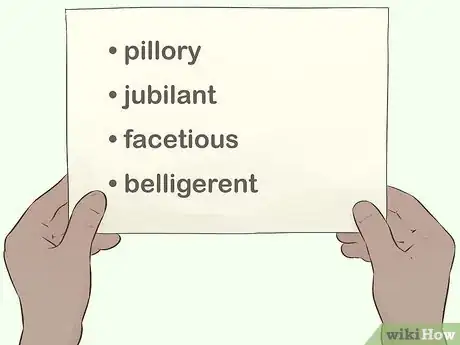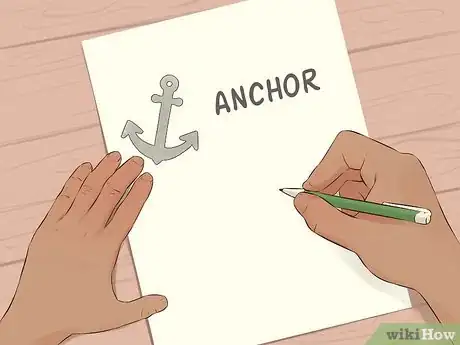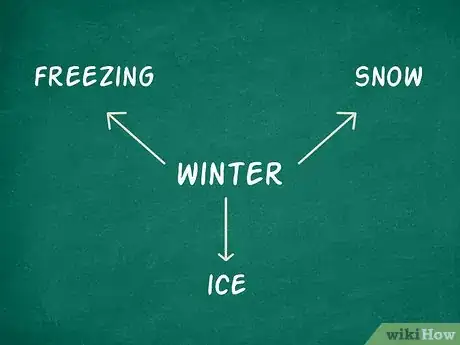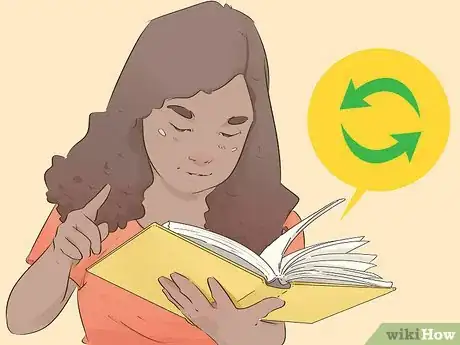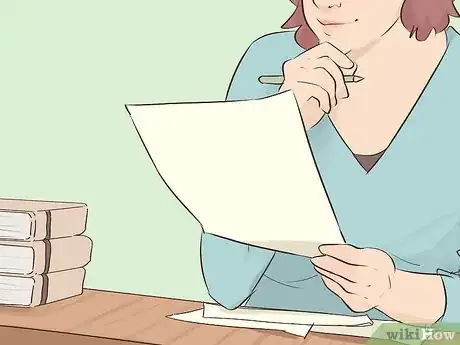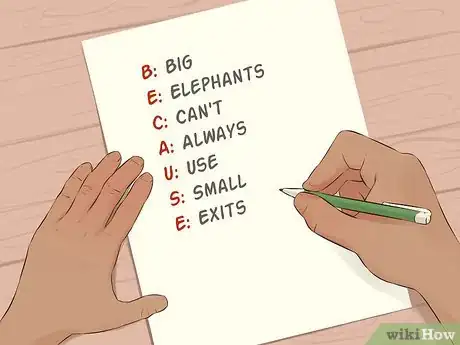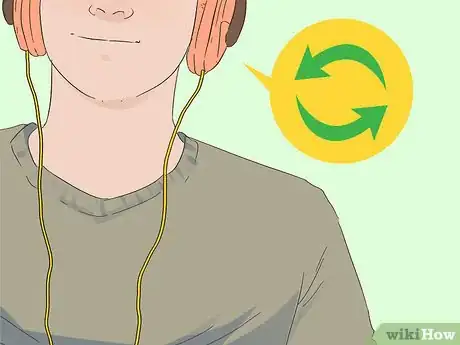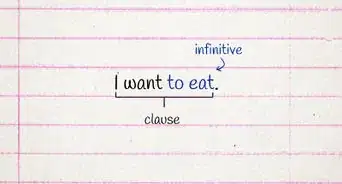This article was co-authored by Christopher Taylor, PhD. Christopher Taylor is an Adjunct Assistant Professor of English at Austin Community College in Texas. He received his PhD in English Literature and Medieval Studies from the University of Texas at Austin in 2014.
This article has been viewed 375,939 times.
Memorizing words quickly is often a very daunting task. Sometimes we have word lists -- like a list of vocabulary words -- that are so overwhelming that we are overcome by the magnitude of the task rather than spending our time getting started. Fortunately, there are a number of methods of memorizing words quickly that take a potentially overwhelming task and make it fun. Ultimately, you need to remember that knowing words and vocabulary is not a bad thing – it will help you meet your goal and enrich your intellect in the process.
Steps
Using Word Association and Mnemonic Devices
-
1Have the words you need to memorize printed out in front of you. It doesn't matter what the source of the words is — a textbook, a vocabulary list your teacher gave you, a list of words from the internet — as long as you have them in front of you so you can work on memorizing them. You may even want to write down the words yourself to help even more with your memorization.
- For example, if you're trying to memorize a list of vocabulary words in a textbook, you could write out the words by hand on a sheet of paper.
-
2Break the words up into smaller groups. Divide the words into smaller, more manageable groups. Breaking your words up will make it so you can more easily create word association and mnemonic devices to memorize your words. If you want to memorize them in order, that’s okay — you don't need to break the words up into smaller groups.[1]
- Use your best judgement when and if you'll be breaking your list up and moving words around.
Advertisement -
3Underline the first letter of every word in the groups. You’re going to use the first letter of every word to create memory devices that will make it easier to memorize the words. You’ll do this two ways: either creating a sentence or an acronym.[2]
- The first letter of every word will create an acronym.
- For the order of operations in math (Parentheses, Exponents, Multiplication, Division, Addition, Subtraction), you’ll have p, e, m, d, a, and s. This will spell P.E.M.D.A.S.
- This works best with word lists of 10 or less.
-
4Memorize the acronym. Now spend a little time memorizing your acronym (P.E.M.D.A.S.) This shouldn’t take too long, and before long you’ll have it memorized. This might be as far as you need to go with this approach.[3]
-
5Create a sentence to remember based on the first letter of every word. If you want to take an extra step to memorize your word groups, take the first letter of every word (your acronym), and create a sentence based on those letters. You’ll do this by using any word that begins with the first letter of the words in your word groups. For instance:
- You won’t be using the original word, simply another word that begins with the same first letter.
- To remember the order of operations in math (Parentheses, Exponents, Multiplication, Division, Addition, Subtraction), take P.E.M.D.A.S. and assign words to it.
- P.E.M.D.A.S. can be transformed into “Please excuse my dear aunt Sally” or any other number of short sentences.[4]
-
6Review your word groups, acronyms and mnemonic devices. After you’ve memorized a few of your word groups, stop and review them. Don’t spend hours doing this, as your brain will probably be overloading. This method works best when you provide enough time in between memorization.[5]
Visualizing Words
-
1Have the list of words you need to memorize printed out in front of you. These words can come from a textbook, the internet, or a handout you got from a teacher. Either way, it's best to have the words right in front of you so you can memorize them more easily.
- You can also write the words out by hand on a piece of paper, which will help you memorize them even more.
-
2Draw a picture for each word. Drawing a picture that describes each word will help you remember it better. Make sure to maintain the original meaning of each word as best as you can.[6]
- Nouns might be easiest, as you’ll just have to draw the person, place, or thing.
- Adjectives will be somewhat easy. Words like “big” and “beautiful” will be relatively easy to draw.
- Verbs might be more difficult. For a word like “associate” try to draw its meaning (the connection between things).
-
3Create a word association web. Word association webs will help you remember words by associating them with other words. This is a great visual way of memorizing words quickly and will complement other visual approaches to memorization.
- Write the word you want to remember on the center of a sheet of paper.
- Draw lines outward from the center connecting the center word to other words that you associate with it. For example, if the word is “winter” draw a line outward connecting it to “snow” and another line on the other side connecting it to “freezing” and another line on the side connecting it to “ice.” Repeat this process outward until you’re confident you will remember it.
- This should not take more than 3-5 minutes per word.
-
4Create a picture story. Creating a picture story is similar to creating a word or sentence story, but instead of writing it out, you’ll be drawing your story. This method works great for very visual and artistic learners who might be overwhelmed with writing out vocabulary words.
- Take your list of words and quickly draw a picture for each word.
- Try to maintain the original meaning of the word, if you can.
- Organize the pictures so they make a story you can remember.
- This will work great when paired with word association and mnemonic devices.
-
5Spend time reviewing your picture, your web, and your story. The more time you spend looking at and thinking about your visual aids, the better prepared you’ll be and the better you’ll remember your word list. Spread this out over a couple days if possible. Review your visual aids when you have time. Consider:
- Reviewing them while eating.
- Looking at them when you have downtime in between other tasks and projects.
- Spending a couple minutes looking at them and thinking about them when you wake up and before you go to sleep.
Using Sound and Music
-
1Place the list of words you need to learn right in front of you. Having your list of vocabulary words — whether they came from a textbook, the internet, or somewhere else — directly in front of you will make them easier to memorize.
- Handwriting your list of words on a sheet of paper is a great way to kick off the memorization process.
-
2Arrange the words in story or sentence form. After you’ve got your list, arrange the words in a way so that you can create a couple sentences or a story with the words. You don’t want to just build clunky sentences, though. Consider:
- Rhyming words.
- Pairing words cleverly.
- This works best if you don’t have to know the words in a certain order.
- You will be keeping the meaning of each word.
-
3Find a memorable tune to accompany your words. Finding a memorable tune to accompany your arranged words will help you remember them more easily. Think about popular songs or songs that you can easily remember the tune to. Consider the tunes from:[7]
- Your current favorite pop songs.
- Traditional folk tunes like “Molly Malone” or “John Brown’s Body.”
- Pledges, anthems, or hymns, like the American Pledge of Allegiance, the American Marine hymn, or Hail Britannia.
-
4Say or sing the words and their meaning to a tune. After you’ve arranged your words, say the words to yourself out loud. Afterwards, sing or rap the words. This way, you’ve taken your word list, associated with a tune, and now have your own song to memorize! You can sing it to yourself when you’re taking a test or trying to remember your word list.
-
5Sing, repeat or play the song or tune. As you go about your daily chores or travel, sing or repeat the song or tune over and over again. If you've recorded the song or tune (you singing/saying the words over and over), play it back while you're resting, or even sleeping. If you do record it, put the tune, rap or song on loop.
-
6Continue this until you are comfortable. Keep doing this until it feels as if the words and their meanings have stuck in your memory. Music is a great aid to memory, which is why it's so easy to remember pop songs. As a result, this should be a very pleasant and potentially enjoyable way of getting your work done.
Expert Q&A
Did you know you can get expert answers for this article?
Unlock expert answers by supporting wikiHow
-
QuestionHow can I memorize a test quickly?
 Christopher Taylor, PhDChristopher Taylor is an Adjunct Assistant Professor of English at Austin Community College in Texas. He received his PhD in English Literature and Medieval Studies from the University of Texas at Austin in 2014.
Christopher Taylor, PhDChristopher Taylor is an Adjunct Assistant Professor of English at Austin Community College in Texas. He received his PhD in English Literature and Medieval Studies from the University of Texas at Austin in 2014.
English Professor
-
QuestionHow can I remember vocabulary words?
 Christopher Taylor, PhDChristopher Taylor is an Adjunct Assistant Professor of English at Austin Community College in Texas. He received his PhD in English Literature and Medieval Studies from the University of Texas at Austin in 2014.
Christopher Taylor, PhDChristopher Taylor is an Adjunct Assistant Professor of English at Austin Community College in Texas. He received his PhD in English Literature and Medieval Studies from the University of Texas at Austin in 2014.
English Professor
-
QuestionHow can I memorize faster?
 Christopher Taylor, PhDChristopher Taylor is an Adjunct Assistant Professor of English at Austin Community College in Texas. He received his PhD in English Literature and Medieval Studies from the University of Texas at Austin in 2014.
Christopher Taylor, PhDChristopher Taylor is an Adjunct Assistant Professor of English at Austin Community College in Texas. He received his PhD in English Literature and Medieval Studies from the University of Texas at Austin in 2014.
English Professor
Warnings
- Do not make your word association too complicated, use what comes first to your mind.⧼thumbs_response⧽
References
- ↑ https://www.education.vic.gov.au/school/teachers/teachingresources/discipline/english/literacy/readingviewing/Pages/litfocuswordmorph.aspx
- ↑ https://learningcenter.unc.edu/tips-and-tools/enhancing-your-memory/
- ↑ https://learningcenter.unc.edu/tips-and-tools/enhancing-your-memory/
- ↑ https://www.mathsisfun.com/operation-order-pemdas.html
- ↑ https://learnenglishteens.britishcouncil.org/exams/grammar-and-vocabulary-exams/tips-to-remember-words
- ↑ https://learningcenter.unc.edu/tips-and-tools/enhancing-your-memory/
- ↑ https://learningcenter.unc.edu/tips-and-tools/learning-a-second-language/
About This Article
To memorize words quickly, start by writing the words down in a list to study from, since just writing it out can help you remember. Then, underline the first letter of each word and create an acronym that you can easily remember. For simple words, try drawing pictures of each word, keeping the original meaning as much as you can. If these tricks don’t work, set the words to a catchy song and sing it repeatedly until you’ve memorized it. For tips from our Language reviewer on more ways to memorize words, keep reading!
